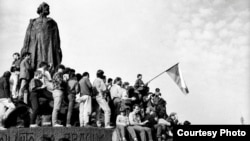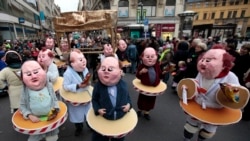To most of the world, the Berlin Wall symbolized the post-World War Two tug of war between Communism and Capitalism. But to the millions of East Europeans who suffered under totalitarian Communist governments imposed on them and supported by the Soviet Union, the Berlin Wall represented decades of repression and the denial of civil liberties and internationally recognized human rights.
So when the Berlin Wall fell on November 9, 1989, it started a series of revolutions that changed Europe, and the world. And the first domino to fall was Czechoslovakia.
Just a week after the events in Berlin, what began as a student protest ended three weeks later with the resignation of the President and the swearing in of a new government.
It began on November 17th, 1989, as an organized student march commemorating the 50th anniversary of International Students’ Day. Originally meant to commemorate the 1939 storming by German occupation forces of Czech universities, and the subsequent killing and deportation of students to concentration camps, the demonstration quickly turned into an anti-government protest, with students carrying banners and chanting anti-Communist slogans. The protest was peaceful, but nonetheless, the riot police cracked down on the students, sending 167 to the hospital.
This caught the attention of the general population, and some 200,000 people began another demonstration on November 19th. By November 20th, as many as half a million people protested peacefully in Prague. The demonstrations snowballed and spread to other cities, and on November 24th, the entire upper echelon of government, including the Communist Party Secretary General, resigned.
On December 10th, Gustav Husak, the sitting President, swore in a new government and then resigned. Finally, on December 29th, the Federal Assembly unanimously voted that playwright and long-time political dissident Vaclav Havel would become President of Czechoslovakia.
The events in Czechoslovakia were remarkable in that the transition of power from repressive government to peaceful protestors, was non-violent, earning the name Velvet or Gentle Revolution.
Other countries soon followed, including some that had previously been absorbed by the Soviet Union, freeing millions of people and marking the end of the Cold War.

















